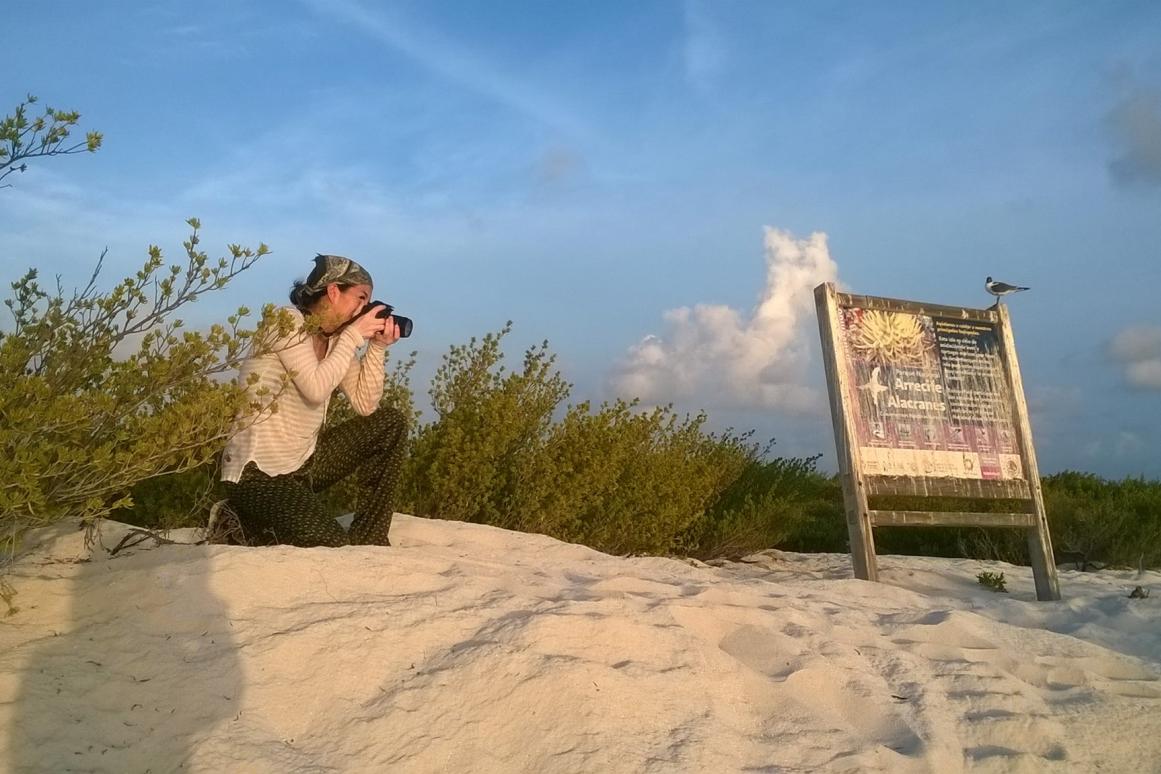Mexican Geosciences Researcher Dr. Abigail Uribe-Martínez comes to HRI on Furgason Fellowship

CORPUS CHRISTI — Visiting scholar and Furgason Fellow Dr. Abigail Uribe-Martínez has spent three weeks at the Harte Research Institute for Gulf of Mexico Studies in July and August working and studying with members of the institute’s Coastal and Marine Geospatial Sciences Lab under HRI Endowed Chair Dr. James Gibeaut.
Uribe-Martínez, a GIS and biostatistics professor at the Autonomous University of Carmen located in Campeche, Mexico, came to the U.S. as a part of the institute’s Furgason Fellowship program, which sponsors Gulf of Mexico research activities by scholars located in Mexico and Cuba, among other activities in the international Gulf nations. Uribe-Martínez spent her time at HRI learning about the lab’s work and capabilities and building the groundwork for a series of projects that will study coral reefs and coastal habitats in the southern Gulf of Mexico through the analysis of high-resolution imagery.
“There is much we can learn through collaboration with our colleagues in Mexico, and Dr. Uribe-Martinez brings notable experience and scientific expertise in understanding how our coastal environments bind us around the Gulf of Mexico,” Gibeaut said.
Uribe-Martínez specializes in using remote sensing and GIS to study the habitat distribution of wetlands, mangroves, seagrasses and other important marine and coastal habitats. She’s studied how critical species like sea turtles interact with those habitats and also looked at the vulnerability of critical species and habitats to coastal hazards like oil spills.
The Mexican researcher said she was excited to spend time working at the Harte Research Institute because there are only a few teams working in geosciences in her region, and she hopes to bring knowledge about new technology and techniques back to her institute. A motivating factor behind the Furgason Fellowship is to promote increased partnerships between Cuban, Mexican and U.S. scientists, and to encourage the exchange of data and ideas.
“A lot of the problems in our environments are pretty similar, but there is a big lag in the geosciences where I am located in the Yucatan peninsula, HRI is on the cutting edge of a lot of research in the Gulf of Mexico,” she said.
In collaboration with the HRI Geospatial Sciences Lab and with frequent HRI partner and Furgason Fellowship International Chair for Coastal and Marine Studies in Mexico Dr. Fernando Nuno Dias Marques Simões, Uribe-Martínez will be partnering on a series of projects to study and assess coral reefs and coastal habitats in the southern Gulf of Mexico.
The main project will be a comparative study between Isla del Carmen, where Uribe-Martínez lives and works in Campeche, and Mustang Island, Texas, which is located near HRI. A secondary project will use imagery of the Alacranes Reef, also known as Scorpion Reef, on the Campeche Shelf north of the Yucatán Peninsula, to map out the distribution of habitats to better understand the health and functioning of the system. HRI hopes to use that work to contribute to a series of environmental report card efforts it is conducting on the health of the Alacranes Reef, of coral reef systems in the Gulf, and eventually on the overall health of the Gulf of Mexico. The idea is that tracking the health of systems over time through these report cards can help to better observe and publicize when systems improve or degrade in health.
The Furgason Fellowship program was established by Ed Harte and Joe Hornblower in honor of Dr. Robert Furgason, President Emeritus of Texas A&M University-Corpus Christi and founding Executive Director of the Harte Research Institute for Gulf of Mexico Studies. The endowment funds teaching and research fellowships at HRI from Mexican or Cuban universities as well as the funding of conferences, workshops, and symposia on subjects related to the Gulf of Mexico.
It was also previously used to found the applied student workshops now known as the Student Workshop on International Coastal and Marine Management (SWIMM) that brought together American, Cuban, and Mexican students to work together on location on a research project
